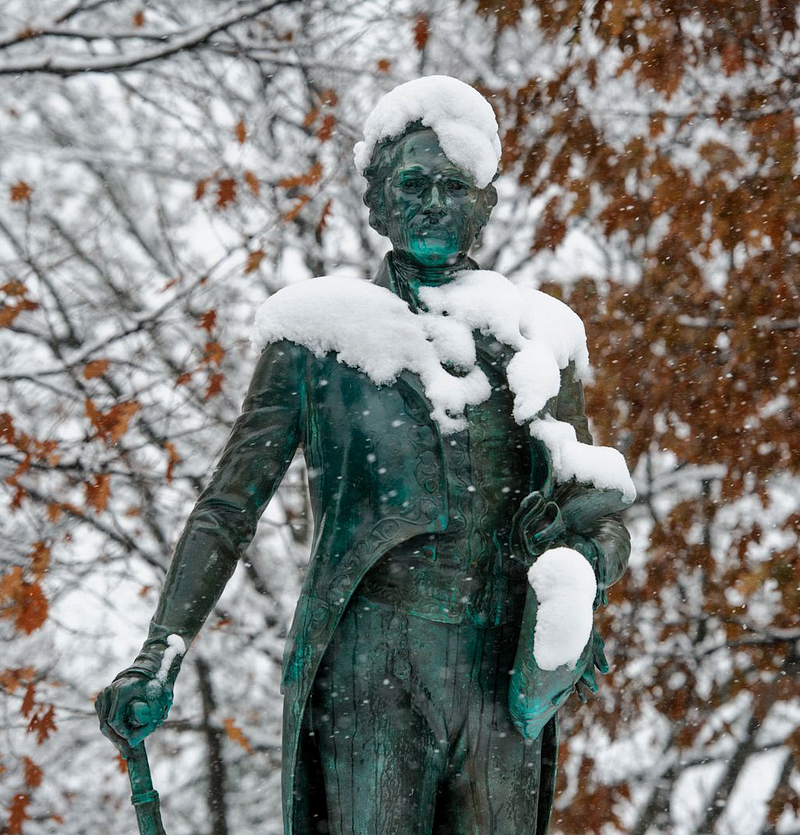
On April 1, Hamilton alumni Avery Morgan ’22, Matthew Marks ’05 and Kate Brouns ’17 joined students and faculty to discuss their respective career journeys in the field of environmental policy and law.
The panelists began by discussing an overview of their career paths, which, in the case of Marks and Brouns, was not always geared toward environmental policy. Marks described his time after Hamilton as his “wayward years,” as he was unsure what to do with his world politics degree, his analytical mind and his passion for the environment. Eventually, he attended Vermont Law School and explained how it helped him focus these aspects of his life and channel it into one ultimate goal: working with the Environmental Protection Agency (EPA). He was able to secure a 2L (second year) summer internship with the EPA in their office of general council and was offered a job after law school.
Marks has worked with the EPA full-time for 12 years now — at first in the Air and Radiation Law Office and now as the Deputy Associate General Counsel. He supervises the attorneys in the office that advises the agency on all areas relating to the Clean Air Act. He acknowledged the common criticism that “working for a big firm is like working for the bad guy.” However, Marks assured that is not the case. He recognized the powerful environmental statutes that are coming from the EPA and their task of implementing and enforcing the laws congress passed. Marks knew he wanted to “be at the center of that action” and “implement big unique environmental laws that form the foundation of environmental laws around the world.”
Brouns was also unsure of what to do directly after Hamilton. She studied math and minored in physics and comparative literature. She joked, “I am doing something now that is completely different, so it that’s you, don’t worry.” For Brouns, her “nontraditional path” toward environmental policy began with her job at an independent Boston bookstore. She recalled an event with Naomi Klein, an environmental activist whose quote “it just so happens that we are all alive at the last possible moment where changing course means saving lives at an unimaginable scale,” gave Brouns the “kick” she needed. She went on to explain how those words pushed her to pursue her masters in environmental policy. After graduating, she started working for Renewable Northwest, which is “a nonprofit that represents a lot of clean energy developers.” Her current position as the Washington State Policy Manager allows her to explore both policy and legislation as well as work in the regulatory sector. She explained how Jan. to April is the legislative session, “which means I drive from Seattle to Olympia to meet with state reps and Senators and educate them on clean energy, give the feedback, testify during committee hearings about organization’s advocacy,” and ensure that laws are functioning in the way they are made to.
Morgan, on the other hand, had a long-held interest in environmental studies, which she majored in during her time at Hamilton. She also worked as a sustainability coordinator, which allowed her to “have [her] hands in different pots,” and work on projects concerning goals like carbon neutrality.
In the summer before her junior year, she got her “first taste of what it looks like working for local government,” interning in Palo Alto and working on green infrastructure products. This experience allowed her to engage in playspace work that was tangible and felt accessible to her. Morgan explained that as a people-oriented person with a focus on the environment and a desire to work with people, her job as a Volunteer and External Affairs Coordinator for the Rose Kennedy Greenway perfectly aligns with her strengths and interests. She coordinates volunteer efforts, development, philanthropy and connects people back with the land. Her position “keeps businesses and individuals in the downtown area” by maintaining the greenway as an ecological space and a “huge pollinator ribbon in the middle of downtown.”
All of the panelists share their gratitude for Hamilton’s preparation for their career. Ultimately, they stress the value of their writing skills. As Marks explained, “good writing can take you anywhere,” and Hamilton’s emphasis on writing taught him how to “write persuasively, concisely and clearly, [which] is a huge piece of what we do.”
















